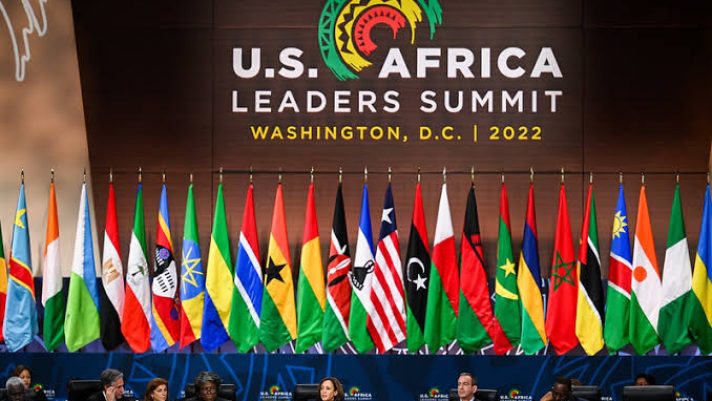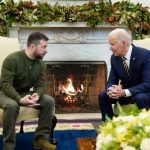By Tope Templer Olaiya, Washington DC
The United States government has assured that outcomes of the just concluded U.S.-Africa Leaders Summit (USALS), including agreements signed at the Deals Room during the Business Forum of the Summit would be implemented fully in a renewed partnership with the continent to tackle global challenges.
In a special online briefing yesterday to discuss outcomes of the Summit, Under Secretary of State for Economic Growth, Energy and Environment, Jose Fernandez, speaking from Washington, D.C., said his optimism is based on the appointment of the foremost and veteran diplomat, Ambassador Johnnie Carson, as Special Presidential Representative for US-Africa Leaders Summit Implementation.
When asked when he would be assuming the role, Fernandez said: “Ambassador Carson is one of my favourite diplomats ever. He is so knowledgeable of the region and he’s someone that I have always respected. I worked with him when I was here at the State Department 10 years ago, and I would just sit back and listen to him, and I was always thrilled to. I also learned a lot from being around him. So, I’m really looking forward to working with him. I don’t know when Johnnie will take his position, but knowing him it won’t be long.”
When questioned on whether the American markets will open up its doors to African SMEs intending to export various commodities on relaxed terms, Fernandez said: “The African Growth and Opportunity Act (AGOA) was of great interest to our African colleagues, and we spent a fair amount of time discussing it. As of today, we have 36 Sub-Saharan African countries that are eligible for the African Growth and Opportunity Act, AGOA. AGOA is legislation passed by Congress in the year 2000, so 22 years ago, that offers almost 6,500 – 6,500 products duty-free access to U.S. markets.
“A lot of these are small and medium enterprises, enterprises that can grow by leveraging AGOA to their benefit. AGOA has been at the core of our trade and investment policy with Sub-Saharan Africa because it, as I said, provides eligible countries with certain duty-free access to the economy and also helps to drive investment in the continent, creating thousands of jobs, promoting regional integration, and enhancing Africa’s export competitiveness. It has also incentivized many African countries to undertake key political and economic reform.
“This was a subject of discussions at the U.S.-Africa Business Forum, where we had businesses, investors, and government leaders, including several heads of state and global CEOs, and we discussed how to take advantage of it. One aspect of AGOA that’s become clear is that we would like African nations to take more advantage of it. We feel, frankly, in some countries that AGOA is underutilized and we spent a lot of time during the summit speaking about why that is and how we could take steps to remedy that situation. AGOA – the U.S. is a big market, and I think if we can – if we can help African nations make better use of AGOA, I think our partnership can only grow.”
He noted that at the center of the new engagement was a partnership. “Partnership is a foundation of President Joe Biden’s strategy for Africa because we know that we can’t address the challenges of our time without bringing everyone to the table. That means government at every level, institutions, the private sector and the African Diaspora.
“Also, when we talk about priorities like conservation, climate change, clean energy transition, supply chains, investment, entrepreneurship and innovation, we need the full force of our collaboration to be successful because we’re not going to be able to tackle these challenges alone.
“As the President announced, the administration plans to invest at least $55 billion in Africa over the next three years, working closely with our Congress. New investment and policy initiatives at the summit included the signing of a memorandum of understanding between the U.S. and the African Continental Free Trade Area Secretariat in order to promote equitable, sustainable, and inclusive trade – a trade that will be continent-wide and the trade that will open up a $3.4 trillion market of 1.3 billion people. That is a large market – it’s a huge market – and that’s what we intend to work on with this memorandum of understanding.
“The Millennium Challenge Corporation also announced its first regional compact, totalling $504 million, with the Government of Benin, and Niger, to support regional integration, trade, and cross-border collaboration in those two countries. In addition, the Millennium Challenge Corporation announced that the Gambia and Togo are eligible to develop their first compacts, that Senegal is eligible to develop a regional compact, and that Mauritania is eligible to develop a threshold program.
“Then, on December 13th, Nigeria and Rwanda became the first African countries to sign the Artemis Accords. The Artemis Accords are based on the 1967 Outer Space Treaty, which was the principle that advanced the safe, sustainable, and responsible exploration and use of outer space.
“During the week I also had productive discussions with public and private sector partners on strengthening critical minerals and battery supply chains that help grow our economies and tackle the climate crisis. This work continues. It continues to deepen collaboration to support diverse and secure critical mineral supply chains at all stages – not only on the mining side but also on the processing side.
“And to that end, I was pleased to join the Democratic Republic of the Congo and Zambia – Presidents Tshisekedi and Hichilema – to sign a memorandum of understanding to demonstrate U.S. support for the DRC-Zambia cooperation agreement to build a processing plant on the DRC-Zambia border. This is an agreement that’s going to develop an electric vehicle value chain to help reduce carbon emissions and also support global response to the climate crisis. And the plan is to develop an EV battery supply chain that opens the door for U.S. and like-minded investors to keep more value added in Africa.
“I also spent some time and met with several of my counterparts from the DRC to continue our discussion on identifying ways to expand opportunities for sustainable economic development through the U.S.-DRC Sustainable Development Solutions Working Group that we established a couple of months ago, following Secretary Blinken’s trip to the Democratic Republic of the Congo. Together we will continue to assess in this working group the environmental and social impacts of oil and gas exploration that will help achieve the DRC’s stated objective of ensuring that critical ecosystems are not damaged – are not damaged by potential extractive activities.
“We also discussed in every forum that we had how public-private partnerships can facilitate entrepreneurship and innovation. This is important because, with Africa’s large youthful population, we need to find ways to bolster these partnerships by engaging with the private sector, including a – we have a delegation planned to go to Ghana in February that was announced at the summit’s innovation gathering. We also facilitate ecologically sound trade and investment between the U.S. and African nations, and advanced diplomacy and look for all ways to create growth, opportunity, and employment.
“As Secretary Blinken has said, the challenges and opportunities of the current moment are not just African issues or, frankly, just American issues. They are global priorities, and we are committed to working hand in hand with African nations and institutions on these priorities. We are not going to be able to move forward on them without the support of the African nations, without cooperating with the African nations. And I think during the summit, we delivered on that goal and we will continue working hard to make it a reality going forward,” he stated.









Muchas gracias. ?Como puedo iniciar sesion?